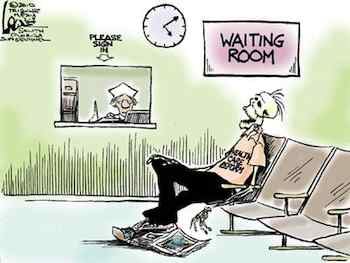- MENU
- HOME
- SEARCH
- WORLD
- MAIN
- AFRICA
- ASIA
- BALKANS
- EUROPE
- LATIN AMERICA
- MIDDLE EAST
- United Kingdom
- United States
- Argentina
- Australia
- Austria
- Benelux
- Brazil
- Canada
- China
- France
- Germany
- Greece
- Hungary
- India
- Indonesia
- Ireland
- Israel
- Italy
- Japan
- Korea
- Mexico
- New Zealand
- Pakistan
- Philippines
- Poland
- Russia
- South Africa
- Spain
- Taiwan
- Turkey
- USA
- BUSINESS
- WEALTH
- STOCKS
- TECH
- HEALTH
- LIFESTYLE
- ENTERTAINMENT
- SPORTS
- RSS
- iHaveNet.com
Jules Witcover

The clearest message from President Obama's "summit" conference on health-care reform is that if he wants the comprehensive legislation he seeks, he needs to talk more to his fellow Democrats and less to the Republicans.
In practical terms, he must concentrate now on how to cash in on the simple majorities he still holds in the House and
The nearly seven-hour talkathon the other day demonstrated his particular talent for capturing and holding a stage, and use of his presidential credentials to lead and dominate the discussion. But while Obama pointed out from time to time areas of possible cooperation with the other party, the Republicans' leaders repeatedly voiced their rigid resistance to same.
Several other
In customary Obama fashion, the president indicated at the end that he would allow up to six-weeks' more time for negotiations with the Republicans on areas of possible common ground. But in so doing, he conveyed a clear pessimism about any positive response.
Instead, he telegraphed his need thereafter to press ahead with a reconciliation vote, requiring only a simple Democratic majority in both houses for passage of the reforms. Having failed to achieve them with the super-majority of 58 Democrats and two allied Independents he once had in the
The least of his problems should be overcoming Democratic hesitation to use the reconciliation process -- attaching the arguably not germane health-care legislation to a budget bill. After all, the departed Bush administration used it to win more tax cuts for the wealthy and other pet legislation of questionable relevance to piggybacked bills.
Obama and his strategists need only to consider their chances to win health-care reform after the approaching congressional elections, and other legislative objectives as well, if they don't roll the dice now with the hand they're holding. Predictions of possible Democratic loss of the majorities in both houses in November should be inducement enough to do so.
The president, for all of his invitations for 11th-hour negotiations with the Republicans on the legislation, acknowledged in winding up the Blair House talkathon the wide breach that still remains between the two sides.
"I don't know, frankly, whether we can close that gap," he said. "And if we can't close that gap, then I suspect (
The president waved off a suggestion by Republican Sen. Tom Coburn of Oklahoma for yet another "summit" gabfest, saying "everybody here knows what the issues are. ... We cannot have another year-long debate on this." If another six weeks of reflection don't produce a breakthrough in the
A rough translation: barring a political miracle, the president knows what his next challenge is. He must convince Pelosi and Reid to start corralling Democratic votes for taking the reconciliation route to passage of the health-care reform that now bears his name. Later, he suggested, the voters will weigh in on whether they approve or not.
House Democrats particularly, disappointed over the absence of a public option and other elements of the bill, need to ask themselves how important it is to them to have an effective leader of their own in the Oval Office, heading toward the November elections.
Achieving health-care reform by whatever parliamentary process available shapes up as a make-or-break proposition for the Obama presidency now. That fact should stiffen Democratic backs in